The evolution of mobile computing has HD video cameras in cellphones, entire libraries of music contained on devices that slip into a jacket pocket, and centuries of literature stored on an e-reader that size of a book. With the explosion of mobile computing and ongoing improvement of laptop CPU power and graphics acceleration, one issue still remains – storage. You may have the latest and greatest laptop on the planet, but without the necessary storage capacity to carry around your 1000 hours of music, entire DVD video collection, and decades of digital pictures you may need to carry around additional media to store all your goodies. Worse yet you may be forced to pick and choose what items to keep on the local drive and which files to leave at home – what if I need those files on the road? Seagate continues to answer the cries of road warriors and digital hoarders media enthusiasts. The latest in the momentus line of 2.5″ SATA II laptop hard drives, the model ST9750420AS or 750GB answer to your prayers. Will reviewed the 640GB drive late last year commending the drive’s overall performance and Seagate’s reliable, high-performing drives. The 750GB drive up for review today is the Mac Daddy of the momentus line weighing in at 7200 RPM with a 16MB cache. Join us as we put Seagate’s latest momentus model to the test.
Model ST9750420AS
Seagate’s take
The Momentus family of 2.5-inch laptop drives offers innovative options and features, such as capacity up to 750GB, two different performance speeds, and three significant features.
- Seagate SmartAlign™ technology provides a transition to 4K sectors without the need for software utilities.
- Seagate Self-Encrypting Drives deliver government-grade encryption without performance degradation—protecting your data where it lives. The FIPS 140-2* options are NIST government-certified for both U.S. and Canadian usage with sensitive data.**
- Seagate G-Force Protection™ technology can detect when your laptop is in a free-fall, swing the drive heads to a safe zone and keep the data safe.
- 7200-RPM and 5400-RPM speeds for customized performance, and 8MB and 16MB cache size to enhance your application performance
- 750, 640, 500, 320, 250 and 160GB models for 5400-RPM drives for high-capacity to entry-level and mainstream systems
- 750, 500, 320, 250 and 160GB models for 7200-RPM drives for high-capacity and high-performance systems
–~~~~~~~~~~~~–
Test System
The test setup used to put the drive through the test bed today will be a moderately equipment laptop based on the HP Pavilion dv2500t CTO, with upgraded aftermarket RAM and the Seagate Momentus 750GB. A fresh install of Windows 7 and a few hours waiting for the latest Windows updates and driver install, we are ready to test. Today we will use synthetic benchmark tools to provide a good indication of the drive’s performance namely: ATTO Disk Benchmark, CrystalDiskMark, and HD Tune.
| Processor (CPU) | Intel T7500 (2.20 GHz, 800 MHz FSB, 4M Cache) |
| Chipset | Intel PM965 |
| Memory (RAM) | 4GB (2×2) DDR2-667 |
| Graphics | nVidia GeForce Go 8400M GS |
| HDD | Seagate Momentus 750GB |
| Operating System | Windows 7 Ultimate x64 |
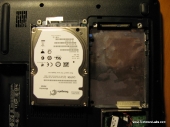 |
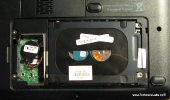 |
| About to install the Seagate drive into the laptop | In place and ready to rock! |
Drive Specifications
A Quick rundown of the technical specification of the ST9750420AS drive. This drive does not feature the self-encrypting technology mentioned in the introduction, and most users will not require this feature (government, private sector usage mostly for privacy/regulation requirements) The 750GB momentus drive is a SATA II or 3Gb/s interface drive with 750GB capacity, 7200RPM, and 16MB cache.
| Model ST9750420AS | |
|---|---|
| Model Number | ST9750420AS |
| Interface | SATA 3Gb/s |
| Cache | 16MB |
| Capacity | 750GB |
| Areal density (avg) | 541Gb/in2 |
| Guaranteed Sectors | 1,465,149,168 |
| PHYSICAL | |
| Height | 9.5mm (0.370 in) |
| Width | 69.85mm (2.750 in) |
| Length | 100.35mm (3.951 in) |
| Weight (typical) | 115g (0.254 lb) |
| PERFORMANCE | |
| Spin Speed (RPM) | 7200 RPM |
| Average latency | 4.2ms |
| Random read seek time | 11.0ms |
| Random write seek time | 13.0ms |
| I/O data transfer rate | 300MB/s |
| Unrecoverable read errors | 1 in 1014 |
| RELIABILITY | |
| Annual Failure Rate | 0.5% |
| POWER | |
| 5V start max current | 1.0A |
| Average idle power | 0.96W |
| Average seek power | 2.5W |
| ENVIRONMENT | |
| Ambient Temperature | |
| Operating | 0°–60°C |
| Nonoperating | -40°–70°C |
| Maximum operating temperature change | 20°C per hour |
| Maximum nonoperating temperature change | 35°C per hour |
| Shock | |
| Operating Shock (max) | 350 Gs for 2ms |
| Nonoperating Shock (max) | 1000 Gs for 1ms |
| ACOUSTICS | |
| Acoustics (Idle Volume) | 2.3 bels |
| Acoustics (Seek Volume) | 2.5 bels |
–~~~~~~~~~~~~–
Benchmarks
ATTO Disk Benchmark v2.46
The ATTO benchmark is a widely-accepted Disk Benchmark freeware utility to help measure storage system performance. It performs read/write tests on the storage system and provides numerical data about the performance of the drive indicated by it’s read speeds and write speeds measured in megabyte per seconds (MB/s). Overall the 750GB drive performed very well with sustained read/write speeds ranging between 100 and 120 MB/s. This drive is very quick!
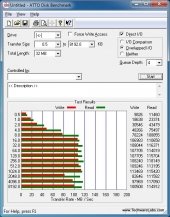 |
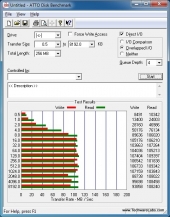 |
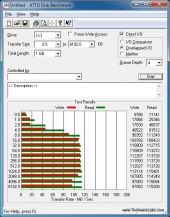 |
|
Results of the 32MB read/write |
Results of the 256MB read/write |
Results of the 1 GB read/write |
CrystalDiskMark x64 v3.0.1
Another widely adopted tool to measure drive performance is CrystalDiskMark. These tests provide valuable information about the drive such as the sequential reads/writes speed & random 512KB, 4KB, 4KB (Queue Depth=32) reads/writes speed. The sequential read/write is basically reading or writing data records one record after the other making for the quickest method of record read/write. The random read/write 512KB, 4KB, 4KB QD32 tests read or write data records in random order, slower and tends to be common when multi-tasking on a computer. CrystalDiskMark was run 5 times for each 50, 100, 500, and 1000 MB test file sizes. The read performance ranges between 102.7 and 116.6 MB/s sequential which again is excellent for a drive of this capacity and in a laptop 2.5″ form factor.
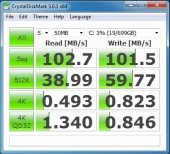 |
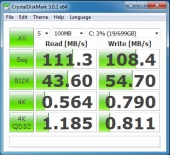 |
||
| 5 x 50MB Test | 5 x 100MB Test | ||
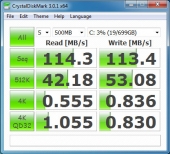 |
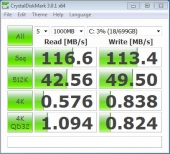 |
||
| 5 x 500MB Test | 5 x 1000MB Test |
HD Tune v4.60
This utility is a great way to subject a drive to a range of read/write tests and see the results in a detailed graph showing the speed and time performance of the drive throughout the course of the test run. HD Tune will also perform a variety of functions including the “ability to measure the drive’s performance, scan for errors, check the health status (S.M.A.R.T.), securely erase all data and much more.” First off for those interested in the advanced specification of the Seagate Momentus 750GB here is what HD Tune Reports:
HD Tune Info about drive
Next up a full read test showing minimum, maximum, and average transfer rates; access time; burst rate; and CPU usage:
Transfer Rates
Minimum: 59.5 MB/s Maximum: 112.9MB/s Average: 88.8 MB/s
Access time: 15.2 ms
Burst rate: 145.9 MB/s
CPU usage: 4.6%
The Seagate Momentus 750GB is fast with an excellent maximum and burst rate. The average transfer rate is fantastic with an approximate 27% increase over the 640GB version reviewed earlier. The access time is a little higher, but this is because of the high capacity of the drive.
Below are some additional tests done with 32KB, 1MB, and 64MB. This drive performs consistently well, especially capable as file size increases.
|
32K |
1MB |
|
|
64M |
EXTRA |
|
–~~~~~~~~~~~~–
Analysis and Conclusion
Speed? Check. Fast? Yes. High-capacity? Some may say overkill! How about PRICE?
With a current online price of about $100 this vast 750GB laptop hard drive is a great solution for the storage hungry laptop-junkie. Solid State Drives are an excellent mobile computing choice – if you have the green to meet the current high price tags. But if you are in need of high capacity storage for your laptop on a budget, without compromising too much, the latest in the momentus line of 2.5″ SATA II laptop hard drives, the model ST9750420AS with its 750GB of storage goodness would be an excellent choice. Although alone no standard consumer rotational hard drive will beat out the performance of an SSD, Seagate offers extreme capacity with great performance, at an affordable price point.


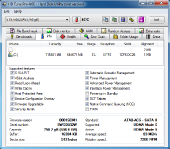
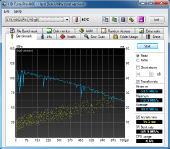
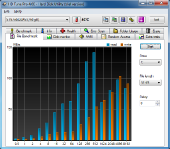
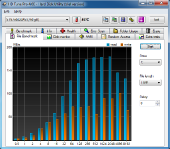
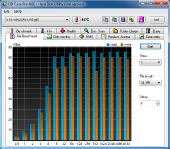
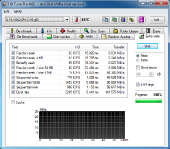
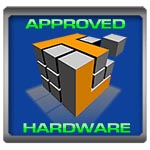
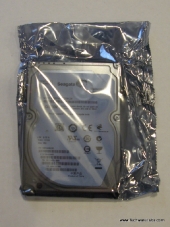
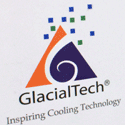
All new drives,whether SSD,SSH or HDD should be SATA III 6gb/s,with backward compatibility for SATA II ans SATA 1.
The switch needs to be made,NOW!
Rotational media and most released SSD’s barely max out the bandwidth of SATA-IO spec SATA II, releasing all drives with SATA III as standard would increase costs so the switch is not totally necessary right now.
If the device is capable of SATA III speeds and exceeds SATA II speeds then yes it should definitely be SATA III